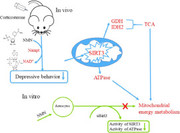Highlights
• Chronic CORT impairs mitochondrial energy metabolism in the hippocampus and liver.
• NMN ameliorates the depression-like behaviors induced by CORT.
• NMN can attenuate the disruption of mitochondrial energy production.
• Sirt3 knockdown in astrocytes reversed effect of NMN by reducing energy production.
Background
Nicotinamide mononucleotide (NMN) has been shown to stimulate oxidative phosphorylation in mitochondria and to improve various pathologies in patients and mouse disease models. However, whether NMN mediates mitochondrial energy production and its mechanism of action in depressed animals remain unclear.
Methods
Mice were subcutaneously injected with corticosterone (CORT; 20 mg/kg) each day for 6 weeks, while another group was given an additional dose of NMN (300 mg/kg) by oral gavage in the last 2 weeks. Then, transcriptome analyses, metabolome analyses and transient gene knockdown in primary mouse cells were performed.
Results
NMN administration alleviated depression-like behavior and the liver weight to body weight ratio in a mouse model of CORT-induced depression. Transcriptome and metabolome analyses revealed that in depressed mice, NMN reduced the mRNA expression of genes involved in fatty acid synthesis, stimulation of β-oxidation and glycolysis, and increased production of acetyl-coenzyme A for the tricarboxylic acid cycle. Importantly, NMN supplementation increased NAD+ levels to enhance sirtuin (SIRT)3 activity, thereby improving mitochondrial energy metabolism in the hippocampus and liver of CORT-treated mice. Sirt3knockdown in primary mouse astrocytes reversed the effect of NMN by inhibiting energy production, although it did not affect NAD+ synthesis
Limitations
Group sample sizes were small, and only one type of primary mouse cell was used
Conclusion
These results provide evidence for the beneficial role of NMN in energy production and suggest that therapeutic strategies that increase the level of NMN can be an effective treatment for depression
https://sci-hub.se/https%3A%2F%2Fwww.sc ... a%253Dihub


